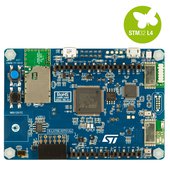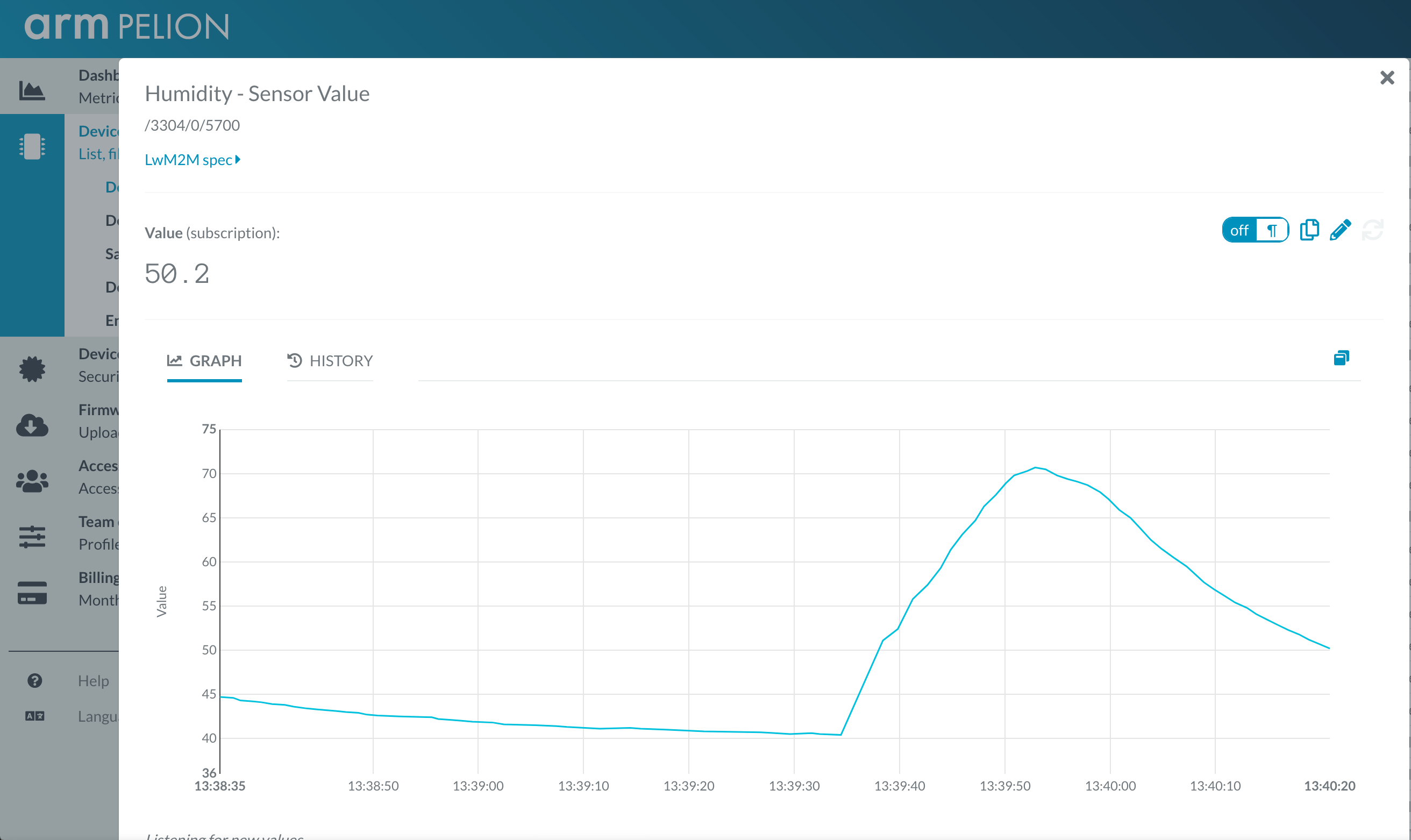Mbed OS and Pelion Device Management example over WIFI for DISCO_L475VG_IOT01 board
Dependencies: X_NUCLEO_COMMON ST_INTERFACES
DEPRECATED
This example application is not maintained and not recommended. It uses an old version of Mbed OS, Pelion DM and Arm toolchain. It doesn't work with Mbed Studio.
Please use: https://os.mbed.com/teams/mbed-os-examples/code/mbed-os-example-pelion/
This example is known to work on the following platforms:
- DISCO_L475E_IOT01A over WiFI and using onboard QSPI flash.

Follow the Quick-Start instructions: https://cloud.mbed.com/quick-start
Example functionality
This example showcases the following device functionality:
- Read onboard temperature and humidity sensors, and report them as Pelion LWM2M resources (see image below).
- On user button click, increment Pelion LWM2M button resource.
- Allow the user to change the state of the board LED from Pelion LWM2M led_state resource and PUT request.
- Uses all onboard sensors and reports them as Pelion LWM2M resources.

Use this example with Mbed CLI
1. Import the application into your desktop:
mbed import https://os.mbed.com/teams/ST/code/pelion-example-disco-iot01 cd pelion-example-disco-iot01
2. Install the CLOUD_SDK_API_KEY
mbed config -G CLOUD_SDK_API_KEY <PELION_DM_API_KEY>
For instructions on how to generate your API key, please see the documentation.
3. Initialize firmware credentials (done once per repository). You can use the following command:
mbed dm init -d "<your company name in Pelion DM>" --model-name "<product model identifier>" -q --force
If above command do not work for your Mbed CLI, please consider upgrading Mbed CLI to version 1.8.x or above.
4. Compile and program:
mbed compile -t <toolchain> -m DISCO_L475VG_IOT01A
(supported toolchains : GCC_ARM / ARM / IAR)
5. You can connect on a virtual terminal/COM port to the platform using:
mbed sterm -b 115200
This should give you an output similar to:
[BOOT] Mbed Bootloader [BOOT] ARM: 00000000000000000000 [BOOT] OEM: 00000000000000000000 [BOOT] Layout: 0 80096F4 [BOOT] Active firmware integrity check: [BOOT] SHA256: 0660E360D432225D5251461998FD8617B017098C5F1F90D5FB607BF8C27ED530 [BOOT] Version: 1553615309 [BOOT] Slot 0 is empty [BOOT] Active firmware up-to-date [BOOT] Application's start address: 0x8010400 [BOOT] Application's jump address: 0x8011041 [BOOT] Application's stack address: 0x20018000 [BOOT] Forwarding to application... Starting Simple Pelion Device Management Client example You can hold the user button during boot to format the storage and change the device identity. Sensors configuration: Invalid new address! HTS221 humidity & temperature = 0xBC LPS22HB pressure & temperature = 0xB1 LIS3MDL magnetometer = 0x3D LSM6DSL accelerometer & gyroscope = 0x6A Connecting to the network using Wifi... Connected to the network successfully. IP address: 192.168.1.3 Initializing Pelion Device Management Client... Initialized Pelion Client. Registering... Registered to Pelion Device Management. Endpoint Name: 0169********************001002d5 ADC temp: 23.0037 C, vref: 0.3661 V HTS221 temp: 28.700 C, humidity: 31.90 % LPS22HB temp: 29.600 C, pressure: 1032.01 mbar LIS3MDL mag: 0.217 x, -0.284 y, -0.053 z [gauss] LSM6DSL acc: 0.005 x, -0.014 y, 1.029 z [g] LSM6DSL gyro: 0.910 x, -0.910 y, 1.120 z [dps] VL53L0X dist: 1855 mm
sensors/LSM6DSL/LSM6DSLSensor.h
- Committer:
- chris
- Date:
- 2020-03-13
- Revision:
- 36:aaf44d2a6c33
- Parent:
- 18:a15bfe7aaebd
File content as of revision 36:aaf44d2a6c33:
/**
******************************************************************************
* @file LSM6DSLSensor.h
* @author CLab
* @version V1.0.0
* @date 5 August 2016
* @brief Abstract Class of an LSM6DSL Inertial Measurement Unit (IMU) 6 axes
* sensor.
******************************************************************************
* @attention
*
* <h2><center>© COPYRIGHT(c) 2016 STMicroelectronics</center></h2>
*
* Redistribution and use in source and binary forms, with or without modification,
* are permitted provided that the following conditions are met:
* 1. Redistributions of source code must retain the above copyright notice,
* this list of conditions and the following disclaimer.
* 2. Redistributions in binary form must reproduce the above copyright notice,
* this list of conditions and the following disclaimer in the documentation
* and/or other materials provided with the distribution.
* 3. Neither the name of STMicroelectronics nor the names of its contributors
* may be used to endorse or promote products derived from this software
* without specific prior written permission.
*
* THIS SOFTWARE IS PROVIDED BY THE COPYRIGHT HOLDERS AND CONTRIBUTORS "AS IS"
* AND ANY EXPRESS OR IMPLIED WARRANTIES, INCLUDING, BUT NOT LIMITED TO, THE
* IMPLIED WARRANTIES OF MERCHANTABILITY AND FITNESS FOR A PARTICULAR PURPOSE ARE
* DISCLAIMED. IN NO EVENT SHALL THE COPYRIGHT HOLDER OR CONTRIBUTORS BE LIABLE
* FOR ANY DIRECT, INDIRECT, INCIDENTAL, SPECIAL, EXEMPLARY, OR CONSEQUENTIAL
* DAMAGES (INCLUDING, BUT NOT LIMITED TO, PROCUREMENT OF SUBSTITUTE GOODS OR
* SERVICES; LOSS OF USE, DATA, OR PROFITS; OR BUSINESS INTERRUPTION) HOWEVER
* CAUSED AND ON ANY THEORY OF LIABILITY, WHETHER IN CONTRACT, STRICT LIABILITY,
* OR TORT (INCLUDING NEGLIGENCE OR OTHERWISE) ARISING IN ANY WAY OUT OF THE USE
* OF THIS SOFTWARE, EVEN IF ADVISED OF THE POSSIBILITY OF SUCH DAMAGE.
*
******************************************************************************
*/
/* Prevent recursive inclusion -----------------------------------------------*/
#ifndef __LSM6DSLSensor_H__
#define __LSM6DSLSensor_H__
/* Includes ------------------------------------------------------------------*/
#include "DevI2C.h"
#include "LSM6DSL_acc_gyro_driver.h"
#include "MotionSensor.h"
#include "GyroSensor.h"
#include <assert.h>
/* Defines -------------------------------------------------------------------*/
#define LSM6DSL_ACC_SENSITIVITY_FOR_FS_2G 0.061 /**< Sensitivity value for 2 g full scale [mg/LSB] */
#define LSM6DSL_ACC_SENSITIVITY_FOR_FS_4G 0.122 /**< Sensitivity value for 4 g full scale [mg/LSB] */
#define LSM6DSL_ACC_SENSITIVITY_FOR_FS_8G 0.244 /**< Sensitivity value for 8 g full scale [mg/LSB] */
#define LSM6DSL_ACC_SENSITIVITY_FOR_FS_16G 0.488 /**< Sensitivity value for 16 g full scale [mg/LSB] */
#define LSM6DSL_GYRO_SENSITIVITY_FOR_FS_125DPS 04.375 /**< Sensitivity value for 125 dps full scale [mdps/LSB] */
#define LSM6DSL_GYRO_SENSITIVITY_FOR_FS_245DPS 08.750 /**< Sensitivity value for 245 dps full scale [mdps/LSB] */
#define LSM6DSL_GYRO_SENSITIVITY_FOR_FS_500DPS 17.500 /**< Sensitivity value for 500 dps full scale [mdps/LSB] */
#define LSM6DSL_GYRO_SENSITIVITY_FOR_FS_1000DPS 35.000 /**< Sensitivity value for 1000 dps full scale [mdps/LSB] */
#define LSM6DSL_GYRO_SENSITIVITY_FOR_FS_2000DPS 70.000 /**< Sensitivity value for 2000 dps full scale [mdps/LSB] */
#define LSM6DSL_PEDOMETER_THRESHOLD_LOW 0x00 /**< Lowest value of pedometer threshold */
#define LSM6DSL_PEDOMETER_THRESHOLD_MID_LOW 0x07
#define LSM6DSL_PEDOMETER_THRESHOLD_MID 0x0F
#define LSM6DSL_PEDOMETER_THRESHOLD_MID_HIGH 0x17
#define LSM6DSL_PEDOMETER_THRESHOLD_HIGH 0x1F /**< Highest value of pedometer threshold */
#define LSM6DSL_WAKE_UP_THRESHOLD_LOW 0x01 /**< Lowest value of wake up threshold */
#define LSM6DSL_WAKE_UP_THRESHOLD_MID_LOW 0x0F
#define LSM6DSL_WAKE_UP_THRESHOLD_MID 0x1F
#define LSM6DSL_WAKE_UP_THRESHOLD_MID_HIGH 0x2F
#define LSM6DSL_WAKE_UP_THRESHOLD_HIGH 0x3F /**< Highest value of wake up threshold */
#define LSM6DSL_TAP_THRESHOLD_LOW 0x01 /**< Lowest value of wake up threshold */
#define LSM6DSL_TAP_THRESHOLD_MID_LOW 0x08
#define LSM6DSL_TAP_THRESHOLD_MID 0x10
#define LSM6DSL_TAP_THRESHOLD_MID_HIGH 0x18
#define LSM6DSL_TAP_THRESHOLD_HIGH 0x1F /**< Highest value of wake up threshold */
#define LSM6DSL_TAP_SHOCK_TIME_LOW 0x00 /**< Lowest value of wake up threshold */
#define LSM6DSL_TAP_SHOCK_TIME_MID_LOW 0x01
#define LSM6DSL_TAP_SHOCK_TIME_MID_HIGH 0x02
#define LSM6DSL_TAP_SHOCK_TIME_HIGH 0x03 /**< Highest value of wake up threshold */
#define LSM6DSL_TAP_QUIET_TIME_LOW 0x00 /**< Lowest value of wake up threshold */
#define LSM6DSL_TAP_QUIET_TIME_MID_LOW 0x01
#define LSM6DSL_TAP_QUIET_TIME_MID_HIGH 0x02
#define LSM6DSL_TAP_QUIET_TIME_HIGH 0x03 /**< Highest value of wake up threshold */
#define LSM6DSL_TAP_DURATION_TIME_LOW 0x00 /**< Lowest value of wake up threshold */
#define LSM6DSL_TAP_DURATION_TIME_MID_LOW 0x04
#define LSM6DSL_TAP_DURATION_TIME_MID 0x08
#define LSM6DSL_TAP_DURATION_TIME_MID_HIGH 0x0C
#define LSM6DSL_TAP_DURATION_TIME_HIGH 0x0F /**< Highest value of wake up threshold */
/* Typedefs ------------------------------------------------------------------*/
typedef enum
{
LSM6DSL_INT1_PIN,
LSM6DSL_INT2_PIN
} LSM6DSL_Interrupt_Pin_t;
typedef struct
{
unsigned int FreeFallStatus : 1;
unsigned int TapStatus : 1;
unsigned int DoubleTapStatus : 1;
unsigned int WakeUpStatus : 1;
unsigned int StepStatus : 1;
unsigned int TiltStatus : 1;
unsigned int D6DOrientationStatus : 1;
} LSM6DSL_Event_Status_t;
/* Class Declaration ---------------------------------------------------------*/
/**
* Abstract class of an LSM6DSL Inertial Measurement Unit (IMU) 6 axes
* sensor.
*/
class LSM6DSLSensor : public MotionSensor, public GyroSensor
{
public:
enum SPI_type_t {SPI3W, SPI4W};
LSM6DSLSensor(SPI *spi, PinName cs_pin, PinName INT1_pin=NC, PinName INT2_pin=NC, SPI_type_t spi_type=SPI4W);
LSM6DSLSensor(DevI2C *i2c, uint8_t address=LSM6DSL_ACC_GYRO_I2C_ADDRESS_HIGH, PinName INT1_pin=NC, PinName INT2_pin=NC);
virtual int init(void *init);
virtual int read_id(uint8_t *id);
virtual int get_x_axes(int32_t *pData);
virtual int get_g_axes(int32_t *pData);
virtual int get_x_sensitivity(float *pfData);
virtual int get_g_sensitivity(float *pfData);
virtual int get_x_axes_raw(int16_t *pData);
virtual int get_g_axes_raw(int16_t *pData);
virtual int get_x_odr(float *odr);
virtual int get_g_odr(float *odr);
virtual int set_x_odr(float odr);
virtual int set_g_odr(float odr);
virtual int get_x_fs(float *fullScale);
virtual int get_g_fs(float *fullScale);
virtual int set_x_fs(float fullScale);
virtual int set_g_fs(float fullScale);
int enable_x(void);
int enable_g(void);
int disable_x(void);
int disable_g(void);
int enable_free_fall_detection(LSM6DSL_Interrupt_Pin_t pin = LSM6DSL_INT1_PIN);
int disable_free_fall_detection(void);
int set_free_fall_threshold(uint8_t thr);
int enable_pedometer(void);
int disable_pedometer(void);
int get_step_counter(uint16_t *step_count);
int reset_step_counter(void);
int set_pedometer_threshold(uint8_t thr);
int enable_tilt_detection(LSM6DSL_Interrupt_Pin_t pin = LSM6DSL_INT1_PIN);
int disable_tilt_detection(void);
int enable_wake_up_detection(LSM6DSL_Interrupt_Pin_t pin = LSM6DSL_INT2_PIN);
int disable_wake_up_detection(void);
int set_wake_up_threshold(uint8_t thr);
int enable_single_tap_detection(LSM6DSL_Interrupt_Pin_t pin = LSM6DSL_INT1_PIN);
int disable_single_tap_detection(void);
int enable_double_tap_detection(LSM6DSL_Interrupt_Pin_t pin = LSM6DSL_INT1_PIN);
int disable_double_tap_detection(void);
int set_tap_threshold(uint8_t thr);
int set_tap_shock_time(uint8_t time);
int set_tap_quiet_time(uint8_t time);
int set_tap_duration_time(uint8_t time);
int enable_6d_orientation(LSM6DSL_Interrupt_Pin_t pin = LSM6DSL_INT1_PIN);
int disable_6d_orientation(void);
int get_6d_orientation_xl(uint8_t *xl);
int get_6d_orientation_xh(uint8_t *xh);
int get_6d_orientation_yl(uint8_t *yl);
int get_6d_orientation_yh(uint8_t *yh);
int get_6d_orientation_zl(uint8_t *zl);
int get_6d_orientation_zh(uint8_t *zh);
int get_event_status(LSM6DSL_Event_Status_t *status);
int read_reg(uint8_t reg, uint8_t *data);
int write_reg(uint8_t reg, uint8_t data);
/**
* @brief Attaching an interrupt handler to the INT1 interrupt.
* @param fptr An interrupt handler.
* @retval None.
*/
void attach_int1_irq(void (*fptr)(void))
{
_int1_irq.rise(fptr);
}
/**
* @brief Enabling the INT1 interrupt handling.
* @param None.
* @retval None.
*/
void enable_int1_irq(void)
{
_int1_irq.enable_irq();
}
/**
* @brief Disabling the INT1 interrupt handling.
* @param None.
* @retval None.
*/
void disable_int1_irq(void)
{
_int1_irq.disable_irq();
}
/**
* @brief Attaching an interrupt handler to the INT2 interrupt.
* @param fptr An interrupt handler.
* @retval None.
*/
void attach_int2_irq(void (*fptr)(void))
{
_int2_irq.rise(fptr);
}
/**
* @brief Enabling the INT2 interrupt handling.
* @param None.
* @retval None.
*/
void enable_int2_irq(void)
{
_int2_irq.enable_irq();
}
/**
* @brief Disabling the INT2 interrupt handling.
* @param None.
* @retval None.
*/
void disable_int2_irq(void)
{
_int2_irq.disable_irq();
}
/**
* @brief Utility function to read data.
* @param pBuffer: pointer to data to be read.
* @param RegisterAddr: specifies internal address register to be read.
* @param NumByteToRead: number of bytes to be read.
* @retval 0 if ok, an error code otherwise.
*/
uint8_t io_read(uint8_t* pBuffer, uint8_t RegisterAddr, uint16_t NumByteToRead)
{
if (_dev_spi) {
/* Write Reg Address */
_dev_spi->lock();
_cs_pin = 0;
if (_spi_type == SPI4W) {
_dev_spi->write(RegisterAddr | 0x80);
for (int i=0; i<NumByteToRead; i++) {
*(pBuffer+i) = _dev_spi->write(0x00);
}
} else if (_spi_type == SPI3W){
/* Write RD Reg Address with RD bit*/
uint8_t TxByte = RegisterAddr | 0x80;
_dev_spi->write((char *)&TxByte, 1, (char *)pBuffer, (int) NumByteToRead);
}
_cs_pin = 1;
_dev_spi->unlock();
return 0;
}
if (_dev_i2c) return (uint8_t) _dev_i2c->i2c_read(pBuffer, _address, RegisterAddr, NumByteToRead);
return 1;
}
/**
* @brief Utility function to write data.
* @param pBuffer: pointer to data to be written.
* @param RegisterAddr: specifies internal address register to be written.
* @param NumByteToWrite: number of bytes to write.
* @retval 0 if ok, an error code otherwise.
*/
uint8_t io_write(uint8_t* pBuffer, uint8_t RegisterAddr, uint16_t NumByteToWrite)
{
int data;
if (_dev_spi) {
_dev_spi->lock();
_cs_pin = 0;
data = _dev_spi->write(RegisterAddr);
_dev_spi->write((char *)pBuffer, (int) NumByteToWrite, NULL, 0);
_cs_pin = 1;
_dev_spi->unlock();
return data;
}
if (_dev_i2c) return (uint8_t) _dev_i2c->i2c_write(pBuffer, _address, RegisterAddr, NumByteToWrite);
return 1;
}
private:
int set_x_odr_when_enabled(float odr);
int set_g_odr_when_enabled(float odr);
int set_x_odr_when_disabled(float odr);
int set_g_odr_when_disabled(float odr);
/* Helper classes. */
DevI2C *_dev_i2c;
SPI *_dev_spi;
SPI_type_t _spi_type;
/* Configuration */
uint8_t _address;
DigitalOut _cs_pin;
InterruptIn _int1_irq;
InterruptIn _int2_irq;
uint8_t _x_is_enabled;
float _x_last_odr;
uint8_t _g_is_enabled;
float _g_last_odr;
};
#ifdef __cplusplus
extern "C" {
#endif
uint8_t LSM6DSL_io_write( void *handle, uint8_t WriteAddr, uint8_t *pBuffer, uint16_t nBytesToWrite );
uint8_t LSM6DSL_io_read( void *handle, uint8_t ReadAddr, uint8_t *pBuffer, uint16_t nBytesToRead );
#ifdef __cplusplus
}
#endif
#endif

